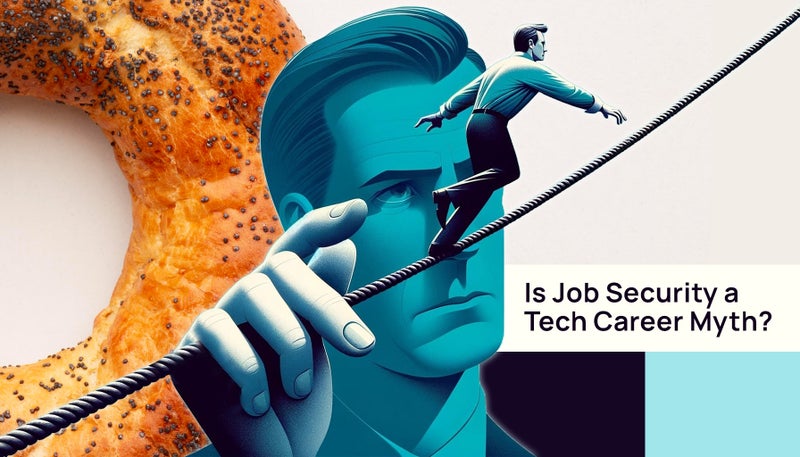Contents
- A Hole New Perspective on Your Tech Career: A Story
- Job Security is a Myth (Not a Must-Have!)
- A Mad Hatter’s Job Market: Tech is Unpredictable
- Wake Up from The Nightmare: Here’s The Dream!
- 1. Change Your Mindset
- 2. Embrace Risk with Both Hands
- 3. Plan for The Best but Prepare for The Worst
- Making Waves: They Carry You Places
Job security is a joke. If you haven’t realized it already – there’s no such thing.
- It’s 2024. So far, 130 tech companies have laid off 32,576 people from around the world.
- If 2023 is anything to go by, remote workers are 35% more likely to be part of this group.
Yikes. It’s a jungle out there, folks. What if you’re next?
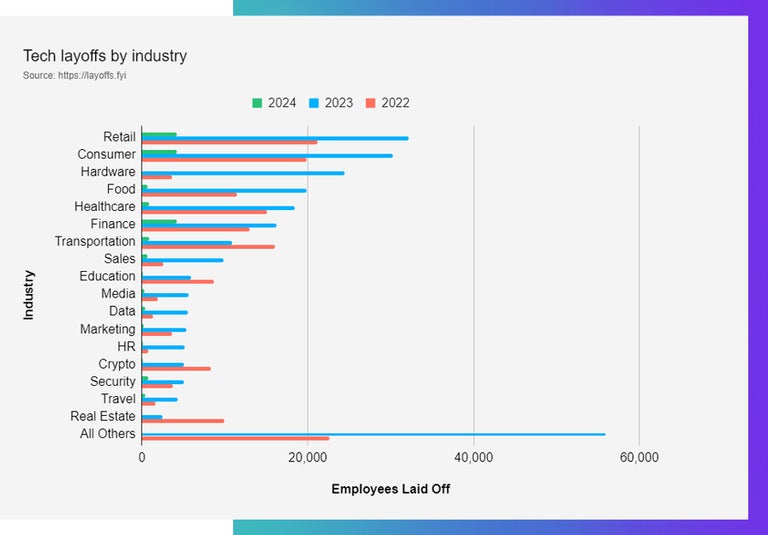
Maybe it has occurred to you, but you’re not sure what that means in your life. Either way, it can be one hell of a revelation to have right after you’ve been laid-off from your ‘secure’ tech job.
No amount of dedication, reliability or positive thinking can prepare you for it. But it’s not your fault. You were told tech is stable, lucrative and secure.
You went down the tech rabbit hole, and now you’re in Wonderland.
The good news is - there’s light at the end of the tunnel.
Your mindset just needs a quick update.
I’m going to wake you up from the mass gaslighting and collective mythology that is endangering your career in tech. And, by the end of this trip - you’ll know exactly what needs to change to make you an even-more formidable force as a remote leader.
A Hole New Perspective on Your Tech Career: A Story
There was once a man who decided to participate in a race in Central Park, with a close friend. They ran the race… and when it was over – the pair came across a long line of people.
It was customary for the race sponsors to dish out freebies, apples, juice – that kind of thing.
On this occasion, it was bagels.
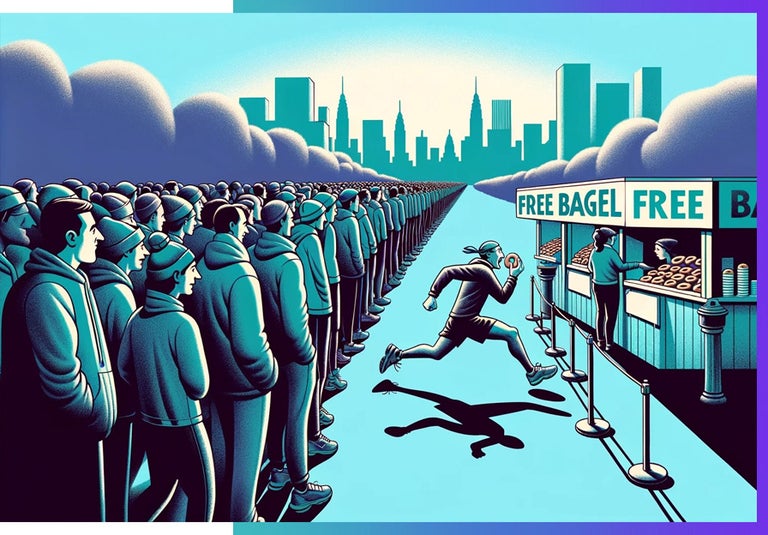
The one friend gestured to the stand and said, “Free bagels!”
“Nah, I don’t want to wait in line,” said the other.
“…but FREE BAGELS!”
The second friend insisted, he would not queue for a bagel.
The story belongs to Simon Sinek, author of Start With Why and many other bestsellers.
He realized that there are two kinds of people in the world. Those who see the line, and those who see the bagel. People who focus on the thing standing in the way of what they want, and people who focus on what they want.
Here’s why this story applies to your tech career.
- Right now, you’re the person focusing on the obstacle. By prioritizing job security, it negatively impacts your approach to your remote career.
- You need to become the kind of person who sees bagels first. When your mindset shifts and you adopt that opportunity-first approach to your career, your life literally changes.
And I’m going to tell you how to do it.
Job Security is a Myth (Not a Must-Have!)
It starts by understanding that you’ve been misled.
You’ve put your faith in a myth, and it’s wrecking your remote tech career.

This myth has led Millennials and Gen Zers to believe that job security is a good thing, when it’s not.
- It encourages complacency: Your goal isn’t to be the best, it’s to hang onto your job for as long as possible. You learn only as much as you need and fall behind.
- You become allergic to risk: Why rock the boat when it’s all smooth sailing from here, right? Your main drivers are continuity, predictability and consistency at work.
- You think small and become less agile: Instead of looking up, you look around. It’s a mindset that discourages timely career leaps, outside-of-the-box thinking and performance boosts.
- You depend on your employers too much! Relying on employers for promotions, career advancement, 100% of your opportunities and much-needed raises is an issue. Workers who stay at companies longer than 2 years get paid 50% less. Ouch!
- Lackluster response to rapid industry shifts: If your company hasn’t adopted AI yet, have you? New tech and new trends aren’t important until it impacts your current job.
Believing in job security is like being on an island: possibilities are limited.
Sure, you can survive there but is it really paradise if you’re scared to leave? The realization that job security doesn’t exist reframes your career so that it becomes more like being on board a ship: limitless possibilities.
I still see articles encouraging tech remote workers to seek out job security (the audacity!).
We’re told having a secure job makes us happier, more mentally stable, and more productive. That we should work HARD on increasing job security by ‘being reliable’ and ‘doing more.’
But the reward for prioritizing job security is less income, fewer learning opportunities and less career mobility.
It’s worse than bad advice. It’s smoke and mirrors.
A Mad Hatter’s Job Market: Tech is Unpredictable
Here’s a hot take:
- Your job title? It doesn’t matter.
- Your employment contract? Doesn’t matter.
- Who your manager is? Doesn’t matter. (Okay it matters a little).
These are the real ‘nice-to-haves.’ They’re secondary to the mindset you apply in your career.
Exactly 0% of tech companies can state with certainty that you will not be cut from your job, even if outside forces trigger mass layoffs.
Everyone ends up on the chopping block at some point.
That’s entirely out of your control.
Mass layoffs don’t happen because people are being lazy, or bad at their jobs. They happen because of external factors that – quite frankly – would make excellent television.
- Elon Musk champions free speech (and cuts 80% of his new workforce)
- AI causes 20,000 layoffs in a month (amidst a talent arms race)
- Big Tech is jostling for power and to maintain unrealistic growth targets!
- People won’t return to the office (CEO’s are livid)
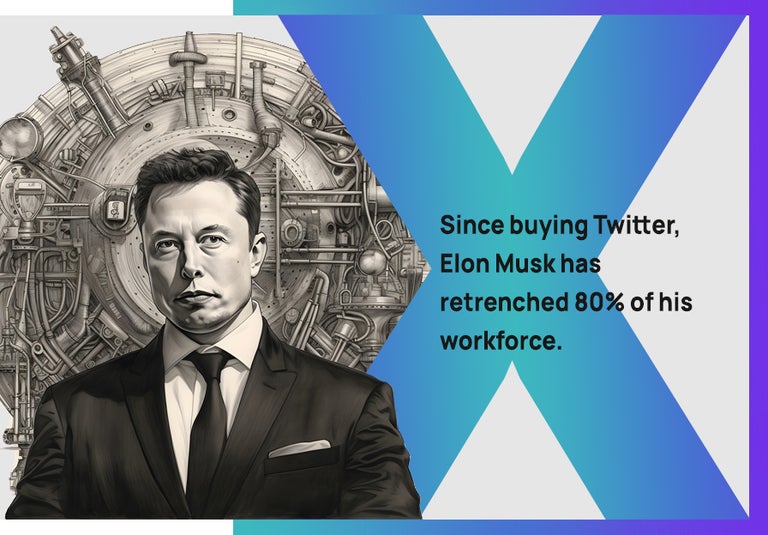
Heaped into this swirling storm of instability are other factors – start-ups come and go. Tech trends rise and fall. Your manager gets itchy and absconds to Barbados.
Teams scale rapidly because of things like AI, pandemics and sudden VC cash injections – then shrink like Alice in Wonderland chugging back a ‘drink me’ potion to one tenth their former size.
And here’s where the myth has teeth:
If you rely on ANY external force to create job security or stability in tech – you will end up devastated. It’s just a matter of time.
Wake Up from The Nightmare: Here’s The Dream!
The only constant in tech is change. Losing your job can be a massive shock, but it’s also a great time for a wake-up call. Have you been basing your career on an illusion all this time?

A job is not just a daily ritual, or a way to exchange hours of your life for a ‘package’ value that will keep you in the same place for as long as possible. The seventies called and they want that idea back.
A job is a slingshot to a brilliant career.
Whether you stay in it for 6 months or 5 years. It is a ship in full sail, not an immovable island. When you think of it this way, you switch from wishing to arrive at stability, to creating it for yourself.
Here’s how:
1. Change Your Mindset
Believing in job security forces you into a passive mindset that focuses on the external. As we’ve discovered, in tech – you’re not going to find stability there.
Studies have shown that companies know people are afraid of losing their jobs, and they use that as a way to reduce costs and increase motivation. If you’re trying to avoid the cut, you’re not going to ask for that raise you deserve.
Switch to an active mindset that focuses on the internal.
- Deprioritize everything that happens that is beyond your control. Instead channel that gorgeous energy into what you can control: yourself.
- Believe in your ability to make the best possible decision for your career.
- Shape yourself into the kind of person who is always curious and always growing.
2. Embrace Risk with Both Hands
Mark Manson has this amazing story about his folks, and how they used to believe that he was some kind of electronics prodigy because he knew how to use the VCR.
It was a new technology at the time, and Mark was curious enough to push all the buttons, explore the plug selection and understand the mechanics.
Being able to program the VCR without looking at the manual was like witnessing the Second Coming of Tesla to his parents.
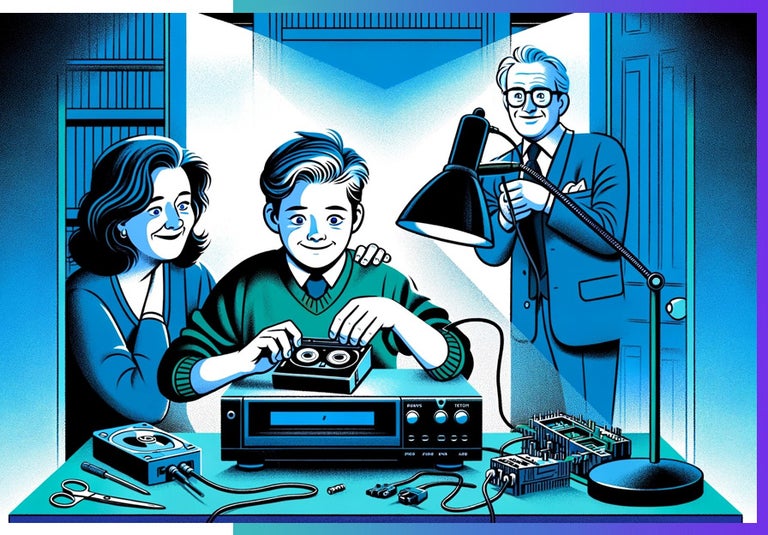
He just did the thing.
From the outside it seemed impossible. From the inside it was easy.
The barrier for his parents wasn’t physical or intellectual – it was emotional.
“Emotions are useful. But they are our biological suggestions, not commandments.”
Mark’s parents never learned to use the VCR because they were scared they’d break something and embarrass themselves. Kid Mark didn’t have those feelings, which is how he learned.
When it comes to your tech career, you can’t let the overwhelming feelings of instability and fear deter you from taking important risks.
Fear is just a signal from your body that you need MORE security. That change needs to happen.
In other words: The barriers keeping you from actual stability are the trainwreck of emotions you’re having over job security...which doesn’t exist. No-wonder you’re stressed!
So, take risks and start implementing strategies to secure yourself.
Like this one -
3. Plan for The Best but Prepare for The Worst
It’s not easy when your financial stability is directly tied to your job. That’s when you start acting from a place of stress, compliance and fear. It seriously hurts your potential at work.
Create a go to hell fund to establish your own security.
A while ago Andrew interviewed Rahul Subramaniam, a CEO of multiple companies and a true remote leader.
Rahul said:
“Make sure that you have at least 1 year of your liabilities or lifestyle expenses covered so that you never feel compelled to do something because you have to save your job. You can say ‘go to hell’ to your employer if you need to.”
Watch the episode below:
(The Go to Hell Fund part is at 6:12)
Rahul’s point was that the way you work changes when you’re afraid of job loss. It turns you into someone focused on being a ‘yes-person’ instead of someone solutions-focused.
Thanks to Dr David Burkus, we know that teams can’t do their best work without a bit of task-focused conflict.
Making Waves: They Carry You Places
Your new career mindset will give you stability, not your job.
Because what you’re investing in is the value of what you can change for the better in your next position. This makes you much more effective in your current role, because you’re fearless.
When you believe in your ability to create career stability, you become your own anchor no matter how stormy the seas get. It all comes back to Simon Sinek and those free bagels.
Either you’re the kind of person who fixates on barriers and uncertainties – or you’re the kind of person who sees beyond the challenges to the tasty bagels that await you.
Everything you do counts towards your next step. Every skill you learn, every piece of knowledge you soak up, every project you complete. They’re all opportunities for career-defining work.
And those barriers? Taking responsibility for your own security, leaning into fear of job loss, being afraid to do The CCAT test because it’s hard?
None of those things look big and scary for someone on the other side of them. They’re just another VCR.
The real risk in tech is believing that your ‘traditional job’ is safe. That external mindset is all about comfort, spotting barriers, and avoiding them. It’s a mindset driven by fear.
Someone with an active, internally-focused mindset would troubleshoot their way past hard. They would see the CCAT, and relish the challenge.
They’re the kind of person we look for here at Crossover.

Technology dramatically reshaped the future of work.
- The average person will hold down 12 jobs in their lifetime.
If job security is always your primary goal, you’ve failed to adjust to the very conditions tech rewards: adaptability, innovation and measured risk-taking.
And worse, you’ve made yourself vulnerable to a fear-based mindset.
I want to see you go:
- From job security stress to career security bliss: Deprioritize what limits your potential and change your mindset.
- From fearing what is hard to embracing risk: You’ll never know how if you don’t do it.
- From seeing the lines to seeing the bagels: Focus on the opportunities in your path.
Clinging to the illusion of job security is holding you back.
You think you’re waiting in line for the bagels, but you’ll never reach them this way.
It’s time to put your emotions aside and accept the hard truth: if you don’t start now, you may never know what career security feels like.
Find those opportunities and seize them!


